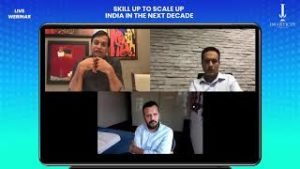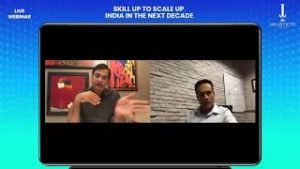Imarticus Learning is a privately held education company located all over India, holding expertise in technical learning. This education company offers classes on various domains through both physical classrooms and virtual online mediums.
In today’s technology-driven world, holding onto a job with hectic timings and updating yourself through education to achieve career growth has become a necessity.
What Imarticus has to offer:
Imarticus offers ‘On the job’ learning with various benefits. For professionals with full-time jobs, this education company provides well-organized sessions through E-learning. The education programs aim to train learners to gain in-demand skills, extract insights, and improve decision making.
The courses are tailored by experts to give hands-on knowledge and experience via industry-specific projects and a cutting-edge curriculum developed following current trends that meet the organization’s and employee’s needs.
With over 3000 hours of developed E-learning classes, they offer a variety of E-learning solutions to educate anyone on a variety of expert fields. They have a capable team equipped with the experience to provide solutions through E-learning classes.
Program features:
The course consists of skill retraining and upskilling, keeping in mind the current requirements of the industry. It comes with a legion of program features like mentorship, integrated LMS (learning management system) which promotes self-paced learning, delivery of learning hours with a team of E-learning professionals, high learning engagement, and post-training evaluation.
These programs help in developing critical thinking, retraining, knowledge enhancement, and strategic development.
 They also conduct skill assessments and competency mapping so as to create a comprehensive learning framework to prepare the new employees and also the existing employees with relevant future skills, dedicated delivery analysts, and account managers to ensure seamless delivery of training.
They also conduct skill assessments and competency mapping so as to create a comprehensive learning framework to prepare the new employees and also the existing employees with relevant future skills, dedicated delivery analysts, and account managers to ensure seamless delivery of training.
Other benefits:
‘On the job’ learning through specialized Imarticus E-learning also promotes various other benefits to the learners.
- Flexibility:
It is far easier for the students to hold on to online learning than traditional classroom learning, especially for professionals with hectic schedules. A stable internet connection and a computer are the only requirements to turn any place into a classroom.
- Accessibility:
These E-learning courses are accessible from all around the country, so even if you are out of the city for work purposes, you will still have continuous access to classes, which would not be possible otherwise.
- Range of specializations:
For the job holders who are looking to improve their skill set through online learning, thousands of hours of useful content that can strengthen their knowledge and skill base is always available. They can choose the best suited to their domains.
- Cost-effectiveness:
The options of E-learning are much more economical than classroom training methods. In today’s economy, where job losses and pay cuts are normal, the students can still be assured that their education will not be affected and, in turn, their careers.
Conclusion:
The global demand for online training programs has increased a lot in recent times. The field of online education has been observing fast growth because of the need to upskill or retrain skills. It’s a boon for anyone looking to progress in their career.




 For this, students can join vocational programs in Finance and Analytics from reputed institutions. Imarticus is one such renowned organization that is offering courses in these subjects to train students and make them job-ready for the business world. By learning these courses students get:
For this, students can join vocational programs in Finance and Analytics from reputed institutions. Imarticus is one such renowned organization that is offering courses in these subjects to train students and make them job-ready for the business world. By learning these courses students get: Fee Waiver on PG Classroom Programs – Up to 25% off
Fee Waiver on PG Classroom Programs – Up to 25% off
 If you’re seeking to get educated on-line in the equal fields, you’re inside the right area. If you’re still at the fence about on-line publications in popular, here is a complete list of advantages that you may expect to gain:
If you’re seeking to get educated on-line in the equal fields, you’re inside the right area. If you’re still at the fence about on-line publications in popular, here is a complete list of advantages that you may expect to gain: Our modern-day #CEOseries functions attractive commercial enterprise conversations with prominent industry leaders as we delve into professional insights from a number of the maximum reputable names within the corporate world.
Our modern-day #CEOseries functions attractive commercial enterprise conversations with prominent industry leaders as we delve into professional insights from a number of the maximum reputable names within the corporate world. Listen Mr. Srinivasan
Listen Mr. Srinivasan

